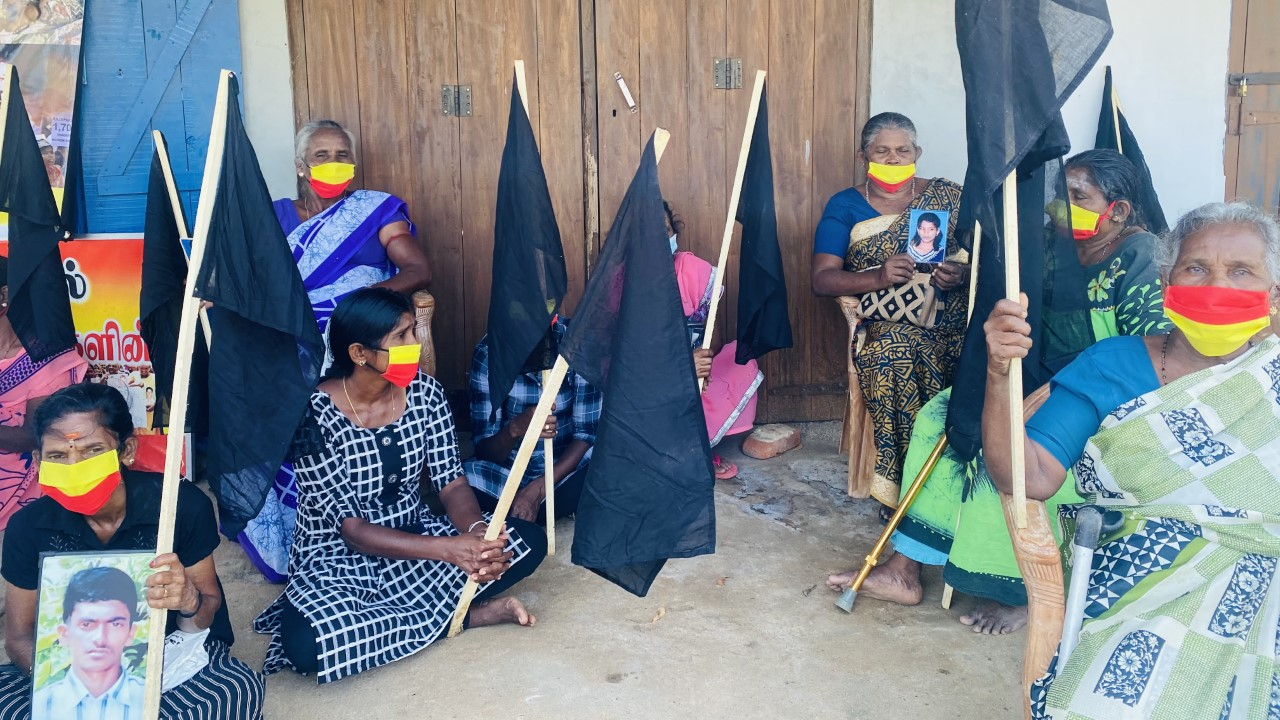On Monday July 5, families of Tamilians who were subjected to enforced disappearance towards the end of the conflict in Sri Lanka demonstrated in Mullaitivu demanding justice. The demonstrators carried placards and banners that read “where are our children that we handed over to the [Sri Lankan] military.”
An estimated 100,000 have been subjected to enforced disappearances in the country’s ethnic conflict, notes the People for Equality and Relief in Lanka, (PEARL), an advocacy group. The conflict ended in 2009 with the brutal suppression of the Liberation Tigers of Tamil Eelam by the Sri Lankan armed forces.
Hundreds of families have been protesting and campaigning for four years to trace the whereabouts of their family members who remain missing. The protests first began in Kilinochchi in 2017 and spread across eight districts of north-east Sri Lanka.
Since the end of the armed conflict, the families of the disappeared have participated in various government commissions to no avail and successive Sri Lankan governments have largely ignored their plight.
In the four years, the families of the disappeared with the support of Tamil civil society have called for an international accountability mechanism for justice and reconciliation in Sri Lanka.
This February, the Association for Relatives of Enforced Disappearances, North and East, signed a letter calling for the situation in Sri Lanka to be referred to the International Criminal Court. The letter demanded increased monitoring by the Office of the High Commissioner for Human Rights, including through field presence and for the establishment of an international evidence-gathering mechanism.
Black Day protets
On the eve of Sri Lanka’s 73rd Independence Day, Tamil families of the disappeared launched a hunger strike in Mullaitivu marking February 4 as “Black Day.” As the majority Sinhalese were celebrating the country’s day of independence, families of the disappeared were seen raising black flags as a mark of protest against the authorities, calling on the international community to facilitate the avenues for justice and reconciliation.
According to Mullaitivu Missing Persons’ Association’s Mariyasuresh Easwary, the Tamil community continues to lack the freedom to speak: “Court orders, police bans, signatures obtained from us under duress, have made carrying out our protests even more difficult. We are searching for our disappeared relatives in this situation,” Easwary said.
State admission on mass disappearances
The issue of mass disappearances in Sri Lanka and the peaceful protests around it by the Tamil community has recently got complicated after the coming of former president Mahinda Rajapaksa to the position of prime minister in October 2019. His brother Gotabaya Rajapaksa is the president. At the time when a majority of these atrocities took place, Mahinda was president and Gotabaya was defense secretary.
As Gotabaya took over, several rights organizations and activists complained that the process of restoring the victims’ human rights had been halted. In January 2019, Gotabaya-led government accepted for the first time, the fate of 10,000 Tamils who had gone missing during the ethnic violence, as dead.
A month after the state statement, Tamil Mothers of the Disappeared wrote to the UN high-commissioner for human rights, pleading that “most of [the mothers] personally and voluntarily handed-over many of our family members, including children, to the Sri Lankan security forces at the end of the war in May 2009 in reliance on assurances that they would be safe. But despite a decade’s wait, there is no answer from the government about those we surrendered and they all remain disappeared,” the letter added.
“We are just asking the authorities to just return our relatives. We are not expecting anything else from them… We are awaiting international justice to help put an end to our misery,” the families of the disappeared persons note.
காணாமல் ஆக்கப்பட்டவர்களின் உறவினர்களால் முல்லைத்தீவில் கவனயீர்ப்பு போராட்டம்#SriLanka #lka #Mullaitivuprotest pic.twitter.com/anzGWUYOoZ
— Virakesari (@virakesari_lk) July 5, 2021





